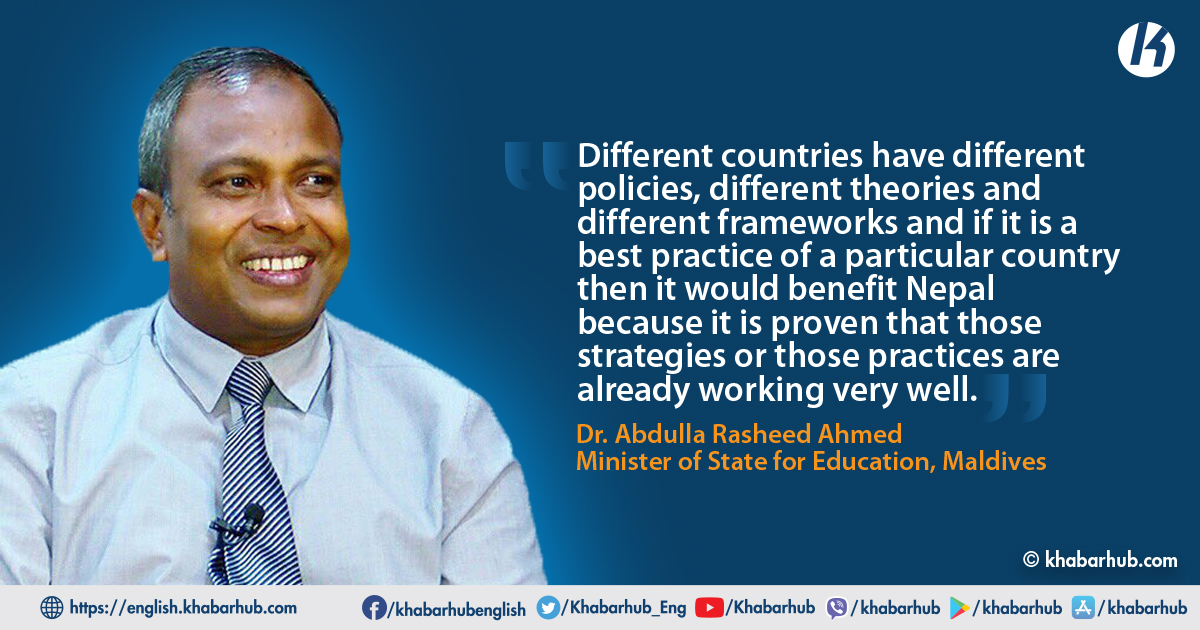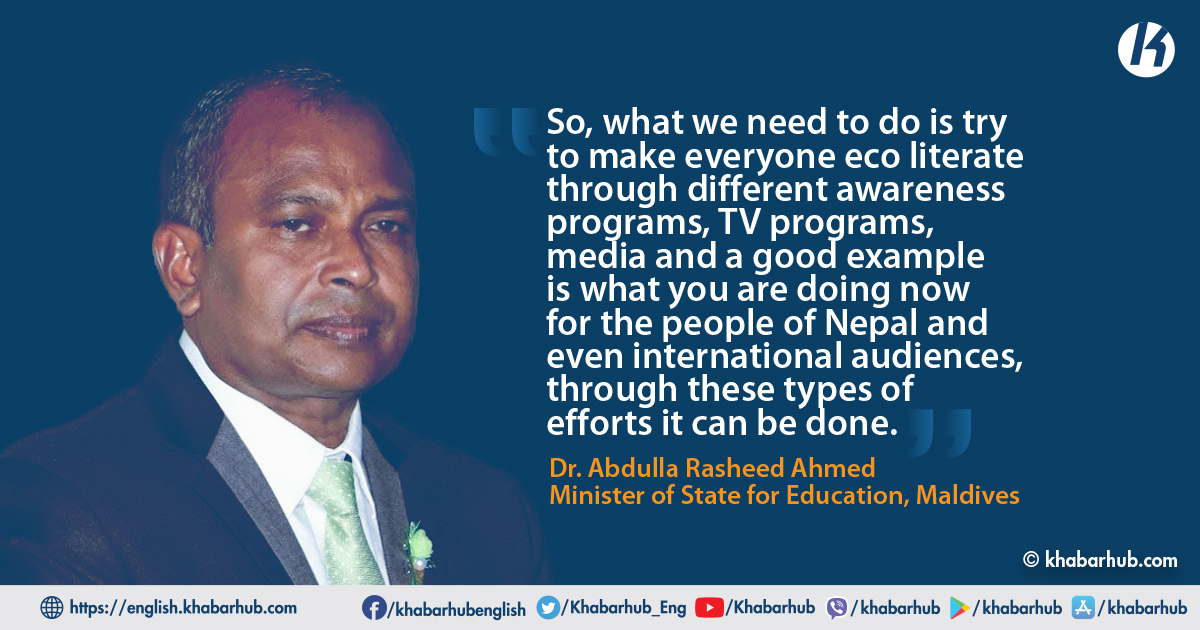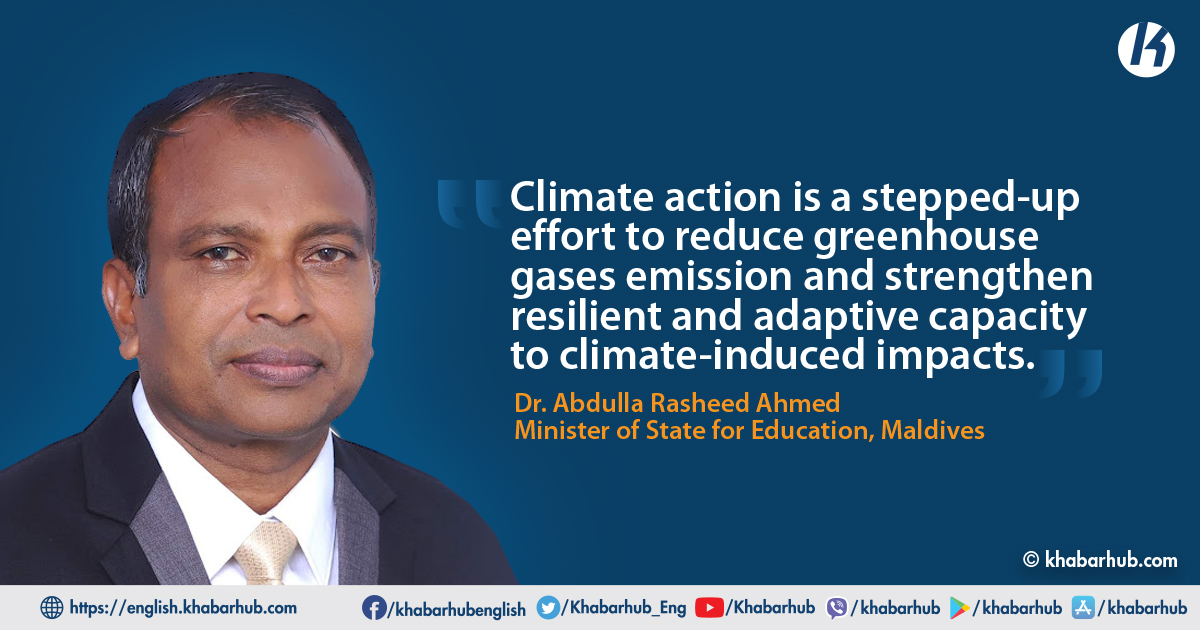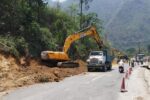Dr. Abdulla Rasheed Ahmed is the Minister of State for Education, Republic of Maldives. He is a distinguished educationalist with 30 years of experience in the field of education. He served as a principal of the government school for 18 years and is Former Vice-Rector of Avid College.
Currently, he is the Head of the National Institute of Education. Dr. Ahmed has been awarded several prestigious national and international awards. He is also the Global Goodwill Ambassador of the International Education Advisory Council. Dr. Pramod Jaiswal, Strategic Affairs Editor at Khabarhub, spoke to Dr. Abdulla Rasheed Ahmed.
As both Nepal and Maldives are heavily dependent on tourism and vulnerable to climate change, the conversation has covered issues related to climate change and tourism in the Maldives.
As the low-lying island nations face an uncertain future or no future at all, the future is relatively gloomier for nations like Kiribati, Tuvalu, and the Maldives. How can the governments of such countries redouble their efforts for more action-oriented programs in their battle against the rising sea?
As you mentioned climate change is really a global issue. From the Maldives, our President is very committed to take all the necessary steps to make the Maldives a low carbon future. The government has plans to phase out single-use plastic and also promote green energy to mitigate the negative impact of climate change.
What is your say on the global arrangements and decisions being made in response to the climate crisis?
In short, I can say, the Maldivian government has given a very high priority in fighting against climate change, promoting the environment and mitigating environmental issues.
In one of your past presentations, you mentioned the importance of global targets and national policies as an effective approach against climate change, what would your vision of such targets and policies be?
My vision is that everyone living in the Maldives will be eco-literate people who are aware of environmental issues on a global scale and then we will act on a national, local and individual level, meaning that in the future we all will think globally and act locally. That’s the vision I have.

Can you share about the ‘Fehi Madharusa’ also known as ‘Green School Initiative’ by the government of Maldives? What are its objectives, and the targeted beneficiaries?
“Fehi Madarsa” or Green School has four pillars – ocean, land, waste management, and innovation. The objectives of this “Fehi Madarsa” of Green School include to reduce the environmental footprint i.e. to reduce environmental impact on the school and individual level including energy, water and waste with a special focus on single-use plastic in line with the government of Maldives phase-out plan.
Another objective is to promote eco-literacy- all school committee members to demonstrate environmental and sustainable literacy with a special focus on ocean stewardship specific to the unique geography of the Maldives.
The third objective of the “Fehi Madarsa” project is to enhance climate prosperity, meaning that to prepare students for a low carbon future that also provides economic prosperity.
The focus is nurturing the resilient innovative generation. The beneficiaries would be students, staff, even the parents and community at large.
What is Eco-literacy and how can education help in promoting Climate action? What are your suggestions on ways to incorporate education as an essential and central part of national and international response to climate change?
Eco-literacy is the ability to understand the natural systems that make life on earth possible. Climate action is needed for this.
Climate action is a stepped-up effort to reduce greenhouse gases emission and strengthen resilient and adaptive capacity to climate-induced impacts. In order to make our people eco literate, there are various ways i.e. through the formal curriculum, non-formal curriculum even at the moment our curriculum has integrated eco-literacy.
Then the question is how about the general public, how about the parents. So, what we need to do is try to make everyone eco literate through different awareness programs, TV programs, media and a good example is what you are doing now for the people of Nepal and even international audiences, through these types of efforts it can be done.
How has Climate change affected highly climate-sensitive economic sectors like Tourism? What kind of challenges has the tourism sector in the Maldives been witnessing at the moment due to Climate Change?
Climate change is an existential threat to small coral islands that make up the Maldives. As you know, over 80 percent of the land area of the world is less than one meter above sea level so if even a meter rise would cause significant loss of the entire land of the Maldives.
So this is really a threat to the tourism industry because millions and billions of dollars have been invested in the tourist islands, guest houses or all the tourism-related investments.
And other effects we can see now is, according to some researchers Maldivian coral reefs experienced two severe bleaching events, one in 1998 and another one in 2016. After the 1998 bleaching event, 90 percent of hard corals died.
It took 16 years for it to recover the pre-bleaching values of live hard coral covers. And also, we can see soil erosion, tidal waves.
Tourists come to the Maldives to enjoy the marine life or underwater beauty which is very famous. Lots of tourists are coming to the Maldives to see the marine life, to see the beautiful coral and those things.
Because of climate change, the coral bleaching is there, the life which depends on these coral reefs would be no more there. So, these are serious issues.
Since tourism contributes to a high level of GHG (Green House Gas) emissions especially derived through energy consumption like the use of fossil fuels, and the transportation of tourists, what mechanisms would you suggest to the tourist destination countries like Maldives and Nepal to reduce the environmental impacts caused by tourism?
Many tourist resorts are already eco-friendly resorts but still as you said there are many things that tourist resorts can do to minimize the greenhouse gases, for example, in the Maldives most of the power is produced by burning fossil fuels so rather than doing that they have to consider to produce more green energy like wind energy, solar energy and the sea waves.
In the Maldives, we have around 12 hours or 11 hours of sunlight daily, so solar energy is very much possible. We can see in some islands, electricity providers that are government companies are also using solar energy.
So, the question is why not all the resorts go for green energy and different means and different modes of green energy, not dependent on one type whether solar energy, wind energy, or energy produced from the waves.
So, these types of investments are really beneficial for everyone because tourist resorts or the tourism industry is very much connected to the environment. So, there is a lot to do.

How would you define the concept of Sustainable Tourism Development? What steps has the Maldives government been taking towards sustainable tourism development?
Sustainable tourism is a kind of tourism that takes full account of its current and future economic and environmental impact in addressing the needs of the visitors in the industry, the environmental and cost community as well.
We should not only think about the benefits at the moment or the present generation alone because this world/earth does not belong to us alone.
We have to give it to the coming generation. Therefore, we should not be greedy or we should not be irresponsible doing things only for the benefit of the present needs.
We have to think about the future as well. Therefore, the aim of sustainable tourism should be to increase the benefit and to reduce the negative impact caused by tourism for destinations.
This can be achieved by protecting the natural environment, marine life and natural resources when developing and managing tourist activities.
Why frameworks as such are important and what can countries like Nepal learn and adopt from such initiatives?
The framework is very important because when we have a framework we would understand the current issues and the scope of that and what are the things we should do. We can see the best practice from different countries.
Different countries have different policies, different theories and different frameworks and if it is a best practice of a particular country then it would benefit Nepal because it is proven that those strategies or those practices are already working very well.
Only what a country can do is taking the best practice or models from another country before implementing them and bring the necessary adjustments to make it fit for the local needs, which will be very helpful.









Comment